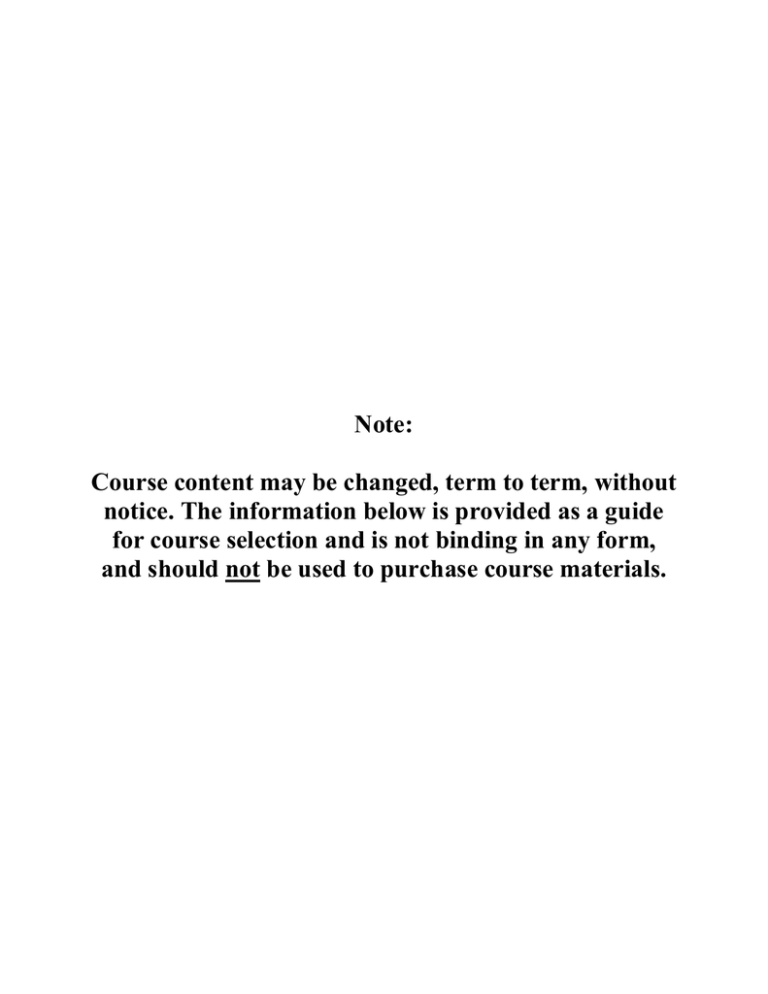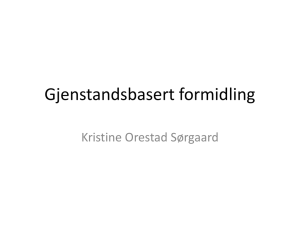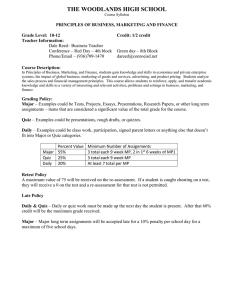Note: Course content may be changed, term to term, without
advertisement

Note: Course content may be changed, term to term, without notice. The information below is provided as a guide for course selection and is not binding in any form, and should not be used to purchase course materials. GOVT 327 Course Syllabus COURSE SYLLABUS GOVT 327 STATE AND LOCAL GOVERNMENT COURSE DESCRIPTION Issues, interest and institutions of American state and local government in the framework of federalism. RATIONALE The student studying government within a politics and policy specialization or minor is required to demonstrate an understanding of a biblical Christian worldview as the foundation for all endeavors of civil government. The student will also establish a working knowledge of the philosophy of limited state constitutional government and local civil government within a federal framework. I. PREREQUISITE For information regarding prerequisites for this course, please refer to the Academic Course Catalog. II. REQUIRED RESOURCE PURCHASE Click on the following link to view the required resource(s) for the term in which you are registered: http://bookstore.mbsdirect.net/liberty.htm III. IV. ADDITIONAL MATERIALS FOR LEARNING A. Computer with basic audio/video output equipment B. Internet access (broadband recommended) C. Microsoft Office MEASURABLE LEARNING OUTCOMES Upon successful completion of this course, the student will be able to: A. Describe the development of American republicanism and the creation of state constitutions. B. Discuss the state religious, ethnic, and cultural settlement patterns. C. Describe the breakdown of federalism and the shift of state authority towards national authority. D. Describe the organization of state government to include the nature of state political participation and state party organization. Page 1 of 3 GOVT 327 Course Syllabus V. E. Discuss the role of legislators in state politics, the history and nature of the state executive branch, and the nature of the state judiciary. F. Describe the state budgetary processes, the nature of state welfare, and the state’s role in education. G. Discuss the organization of local government bodies: county, city, and towns. COURSE REQUIREMENTS AND ASSIGNMENTS A. Textbook readings and lecture presentations B. Course Requirements Checklist After reading the Course Syllabus and Student Expectations, the student will complete the related checklist found in Module/Week 1. C. Discussion Board Forums (5) Discussion boards are collaborative learning experiences. Therefore, the student will create a thread in response to the provided prompt for each forum. Each thread must be 250–300 words and demonstrate knowledge of course-related materials. In addition to the thread, the student is required to reply to 2 other classmates’ threads. Each reply must be at least 100 words. D. Research Papers (3) The student will write three 2–4-page research-based papers in current Turabian format that focuses on the provided topic for that particular paper. The papers must include at least 3–5 scholarly sources, which may include course materials (textbooks and presentations) and the Bible. E. Reflection Paper The student will write a 1–2 page reflection paper in current Turabian format that focuses on his/her belief of biblical authority for federalism. The paper must include 3–5 reference in addition to the course textbook and the Bible. F. Quizzes (4) Each quiz will cover the Reading & Study material for the modules/weeks in which it is assigned. Each quiz will be open-book/open-notes, contain 10 multiple-choice and true/false questions, and have a 1-hour time limit. VI. COURSE GRADING AND POLICIES A. Points Course Requirements Checklist Discussion Board Forums (5 at 60 pts ea) Research Papers (3 at 130 pts ea) Reflection Paper Quizzes (4 at 50 pts ea) Total 10 300 390 110 200 1010 Page 2 of 3 GOVT 327 Course Syllabus B. Scale A = 900–1010 B = 800–899 C = 700–799 D = 600–699 F = 0–599 C. Late Assignment Policy If the student is unable to complete an assignment on time, then he or she must contact the instructor immediately by email. Assignments that are submitted after the due date without prior approval from the instructor will receive the following deductions: 1. Late assignments submitted within one week of the due date will receive a 10% deduction. 2. Assignments submitted more than one week late will receive a 20% deduction. 3. Assignments submitted two weeks late or after the final date of the course will not be accepted. 4. Late Discussion Board threads or replies will not be accepted. Special circumstances (e.g. death in the family, personal health issues) will be reviewed by the instructor on a case-by-case basis. D. Disability Assistance Students with a documented disability may contact Liberty University Online’s Office of Disability Academic Support (ODAS) at LUOODAS@liberty.edu to make arrangements for academic accommodations. Further information can be found at www.liberty.edu/disabilitysupport. Page 3 of 3 COUR ### Course Schedule COURSE SCHEDULE GOVT 327 Textbook: Bowman & Kearney, State and Local Government (2014). MODULE/ WEEK READING & STUDY 1 Bowman & Kearney: ch. 1 2 presentations 2 websites 2 ASSIGNMENTS POINTS Course Requirements Checklist Class Introductions DB Forum 1 10 0 60 Bowman & Kearney: chs. 2–3 3 presentations 2 websites Research Paper 1 Quiz 1 130 50 3 Bowman & Kearney: chs. 6, 9 2 presentations 1 website DB Forum 2 60 4 Bowman & Kearney: chs. 7–8 2 presentations 1 website DB Forum 3 Quiz 2 60 50 5 Bowman & Kearney: chs. 4–5 2 presentations Research Paper 2 130 6 Bowman & Kearney: chs. 10–12 1 presentation DB Forum 4 Quiz 3 60 50 7 Bowman & Kearney: chs. 16–18 1 presentation DB Forum 5 Reflection Paper 60 110 8 Bowman & Kearney: chs. 13–15 1 presentation Research Paper 3 Quiz 4 130 50 TOTAL 1010 DB = Discussion Board NOTE: Each course module/week begins on Tuesday morning at 12:00 a.m. (ET) and ends on Monday night at 11:59 p.m. (ET). The final module/week ends at 11:59 p.m. (ET) on Friday.




